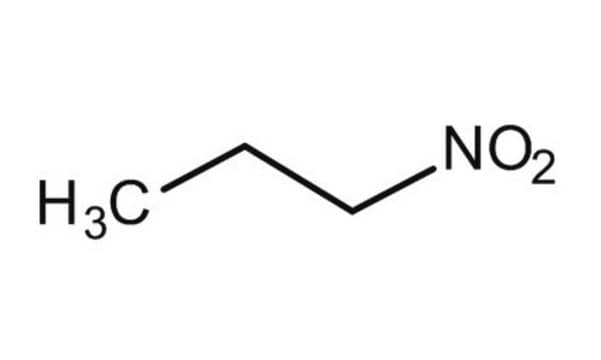N22851
1-Nitropropane
≥98.5%
Synonym(s):
1-Nitropropane
About This Item
Recommended Products
vapor density
3.1 (vs air)
Quality Level
vapor pressure
7.5 mmHg ( 20 °C)
Assay
≥98.5%
form
liquid
autoignition temp.
788 °F
IVD
for in vitro diagnostic use
refractive index
n20/D 1.401 (lit.)
bp
131-132 °C (lit.)
density
0.998 g/mL at 25 °C (lit.)
SMILES string
CCC[N+]([O-])=O
InChI
1S/C3H7NO2/c1-2-3-4(5)6/h2-3H2,1H3
InChI key
JSZOAYXJRCEYSX-UHFFFAOYSA-N
Looking for similar products? Visit Product Comparison Guide
Signal Word
Danger
Hazard Statements
Precautionary Statements
Hazard Classifications
Acute Tox. 3 Inhalation - Acute Tox. 4 Dermal - Acute Tox. 4 Oral - Flam. Liq. 3
Storage Class Code
3 - Flammable liquids
WGK
WGK 1
Flash Point(F)
95.0 °F - closed cup
Flash Point(C)
35 °C - closed cup
Personal Protective Equipment
Certificates of Analysis (COA)
Search for Certificates of Analysis (COA) by entering the products Lot/Batch Number. Lot and Batch Numbers can be found on a product’s label following the words ‘Lot’ or ‘Batch’.
Already Own This Product?
Find documentation for the products that you have recently purchased in the Document Library.
Customers Also Viewed
Our team of scientists has experience in all areas of research including Life Science, Material Science, Chemical Synthesis, Chromatography, Analytical and many others.
Contact Technical Service











